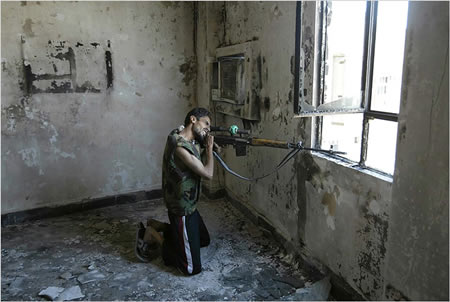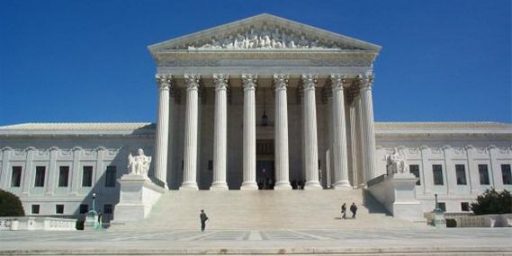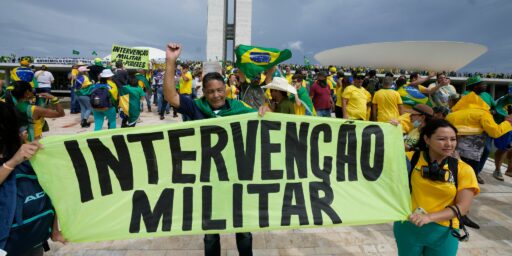Yet Another Outrage From The New York Times
I completely missed this over the weekend, but on Saturday LGF spotted the above photo by Joao Silva in The New York Times that ran with the caption, “A sniper loyal to Shiite cleric Moqtada al Sadr fires towards U.S. positions in the cemetery in Najaf, Iraq.” The caption also includes a comment by Michele McNally, Assistant Managing Editor for Photography at the NYT, gushing, “Right there with the Mahdi army. Incredible courage.”
Well, McNally’s half right: it’s incredible.
Equally baffled, Jeff Goldstein tries to help the “open-minded” people at the NYT get it:
Incredible courage? Well, far be it for me to question such self-congratulatory enthusiasm, but it seems to me that actual “incredible courage” would have entailed, say, Joao Silva getting word to US troops, or bumrushing the sniper and beating him unconscious with a heavy telephoto lens.
One would think, huh? But as LGF notes, Silva “is hawking a book about his uncomfortably close friendships with people who want to kill your neighbors, your sons, and your daughters.”
***
For much more on the photo and Joao Silva, check out today’s Vent.






Courage like hell! The photog doesn’t even have the balls to get a close up of the sniper that would bring his silhouette right in line with the window!
Courage would have been admitting, at the time when we had MF-er Al Sadr cornered, that he was a bad guy and the U.S. had every right to take him out.
1) Either the Madi’s sniper school does not teach accuracy as a virtue or the shot was staged with a less than believable sniper
2) Doesn’t this whole thing bring back memories of Ernie Pyle reporting from the front when he was with the SS at Malmady? Its good to know that the US media of this generation are living up to the efforts of the ‘greatest generation’.
3) If the event was not staged, then there is a certain amount of ‘courage’ associated with being in the same room as a man shooting at US troops. While the chances are that a well placed sniper bullet would be the response, you can’t rule out a more vigorous counter fire solution.
An outrage a day keeps the bad news away!
I’m a little puzzled. Are journalists supposed to double as mercenaries? Is covering the enemy’s activities somehow treasonable? Did we think there weren’t already snipers shooting at us, before the Times showed up?
If anything, such photos and stories allow for the possibility of useful intelligence for our side, which is one reason why enemies seldom allow journalists this kind of access. And the “courage” of the journalist (regardless of whether it’s all that important) is quite real–how much would it take for the Sunni militia to execute him as a spy?
The NYT is proving to everyone that they are the supporters of terrorism here in the US. They would do, say, and print anything to put a dollar in their own greedy pockets.
It’s difficult for anyone, with any sense of decency, have the hate towards America demonstrated to publically as does the NYT.
Anyone who purchases a copy of the NYT is aiding and abetting the destruction of America.
Good point, YAJ: if this was WWII, he would have been with the Nazis.
Anderson –
“Is covering the enemyâ??s activities somehow treasonable?”
Yes – he’s an American first before he is a journalist. He had knowledge of an enemy attack against US forces and failed to make report of that knowledge to our forces. He could have acted to save American lives, but chose not to.
“If anything, such photos and stories allow for the possibility of useful intelligence for our side” – Doubtful. But can they make nice propaganda for the enemy, which I suspect is why they allowed him access in the first place. And why our “courageous” reporter had nothing to fear from the enemy.
So, the photographer was there, and was successful in capturing the picture of a sniper painting his weapon at an American post. Let’s go to a not very hypothetical place here. Let’s imagine that said sniper was successful in killing one or more Americans. Let’s further imagine that the photographer involved wins himself a Pulitzer prize for the photograph.
Are the lives lost as a result of that incident worth the relative in action of shooting a picture versus shooting the sniper?
Certainly, selfish acts require bravery, on occasion. That, however, does not make them more laudable, nor does it make them more valuable.
I’m quite sure that I will be told that my view is simplistic. That there is far more nuanced involved here. But frankly the context of that statement can be found in lesser quantities on any stable floor. Some things, after all, really are that simple.
Hm…I understand the sentiment, but I’m not sure it is that black-and-white. Suppose he was blindfolded and taken to the sniper location. Other than rushing the sniper, which would lead to capture and probably death, there is not much the photographer could do.
Bithead,
Some things are simple, but some things are not. Let’s say that you are dropping the bomb on Hiroshima. Reduced to very simple terms, do you kill many innocents or not? Simple, eh?
Well, no, Hiroshima was not so simple. And neither is this case.
Let’s suppose you were this journalist. You are given an offer to take photos of an enemy sniper. If you say no, there is no benefit at all the US. If you say yes, you could just go do your job, or, you could try to disrupt the attack.
If you try to disrupt the attack, you either try to sneak in a weapon, or you just rush the sniper. Either way, you will be imprisoned, and likely killed. Maybe you will save one life.
In the long term, though, if every journalist tried to disrupt things, then the enemy would quickly stop giving access to journalists. There would be no long term benefit to you sacrificing your freedom and/or life.
The negative effects would be that we would not have any view or understanding of the enemy, other than through a gunsight. He is the enemy, but knowing and understanding the enemy makes defeating him much easier.
So, to summarize, if journalists took an active role in helping the US, there would be a few short term lives saved, but we would ultimately lose something else, perhaps just as valuable in the long run.
And no, I don’t believe in coddling terrorists, or sympathizing with them. I’m a scientist/engineer, not a warrior, but I have no moral qualms about helping to design weapons to kill our enemies better, faster, messier. But one of the reasons I have no moral qualms, is precisely because we have these kinds of journalists.
A free, assertive, energetic press; checks and balances on executive power–yes, these things have a price and a cost, sometimes in human lives. But in the long run, I think these things have allowed the world’s best scientists, engineers, and businessmen (like Einstein, Teller, etc.) to focus on developing the world’s most effective and powerful military, confident in their knowledge that they are working for the good guys.
I suspect there were three guys behind the camara with AK-47s too. Even so, there are some things in life worth more than life – like honor. Here’s a socialist non-American (Scottish ex-pat) who is anti the war in Iraq to tell you I like to think I would have had a go at clubbing the sniper or somehow warning US troops.
Of course, there’s every chance its staged and there are no US troops within miles.
Regards, Cernig
Perhaps the excuses you offer, Anon, would make somewhat more sense, were you to also offer up an explanation as to exactly what benefits to America, are had by this picture? What great moral good is being served that it’s worth the American lives in question?
I’ll save you the trouble; The fact of the matter is that the only good that’s being served here is that of the terrorists themselves, because that picture serves to give them something that they would not otherwise have but for the efforts of a media ; Legitimacy.
And that’s only worth American lives if you’re working against America.
because that picture serves to give them something that they would not otherwise have but for the efforts of a media ; Legitimacy.
Bithead, unlike many OTB commenters, the Sunni militias do not live in a dream world where the NYT’s opinion is particularly significant. They are not losing any sleep at all as to whether they possess “legitimacy” in the eyes of the Times’s readers.
To the extent that the Sunnis are now calling on the U.S. to support them, the Times photo is indeed counterproductive to their supposed wishes.
Anderson, care to support this position?
So now we’re to understand that “the newspaper of record” and its opinion are particularly significant.
I’m speechless at the gymnastics you went through to arrive at that position. However, I don’t consider it any more credible for it.
I put this under a separate response because I consider it a separate topic. There seems to be this misconception that the Sunnis are this monolithic creature which has no dissension within.
Hadn’t occurred to you, I suppose, that the reason that we’re getting mixed messages from these various groups is simply because they haven’t figured out what they want yet?
I would have to agree with those who claim the photo is a setup. There would be too much risk having an outsider present in this situation, why would they take such a risk, when a staged photo would be much easier, and probably look better too.
I also have to agree with those who say the photographer wouldn’t have many options for warning the US soldiers. He would have been searched for weapons or transmitters before even seeing those involved. He would also be under constant armed guard.
What I don’t agree with, is any assertion that this benefits either side to any degree. There is not any new and useful information in the photo for the US military, and the Mehdi army can make and distribute their own propaganda (and regularly do so), and their target audience likely doesn’t read the NY Times. The only people served (or not served) by this photo are the NY Times and their readers.
Actually Silva isn’t an american.So there’s not much of a moral requirement on his part to take one side or the other.
Silva is in fact a Portuguese-born South-African contract employee of the NYT. He’s not even on salary. But I suppose he’ll do to distract yourselves from the wreckage of the policy you all cheered for a few hours. There’ll be another scapegoat along soon enough.
Silva is in fact a Portuguese-born South-African contract employee of the NYT.
Don’t confuse them with the facts, Henley. It’s like teaching a pig to sing.
Here is my question….would there be a legitimate outcry if the sniper shot at Americans and in the resulting normal counterfire, the sniper and photographer got killed?
Outcry by the Times and the Vast Liberal Conspiracy? I don’t think there’d be any legitimate outcry at all (tho of course some kook would go off on “U.S. murderers” and be on Instapundit 3 days later as somehow representative of sensible liberals such as Yours Truly).
Death by “friendly” fire is obviously one of the hazards of covering enemy activity.
Mr. Silva isn’t officially in the war, so he gets some slack.
The NYT is supposed to show news, so I won’t cuss them this time.
The editor is the one who bothers me. Why was a comment necessary?
And if one was, what about “I hope he missed”?